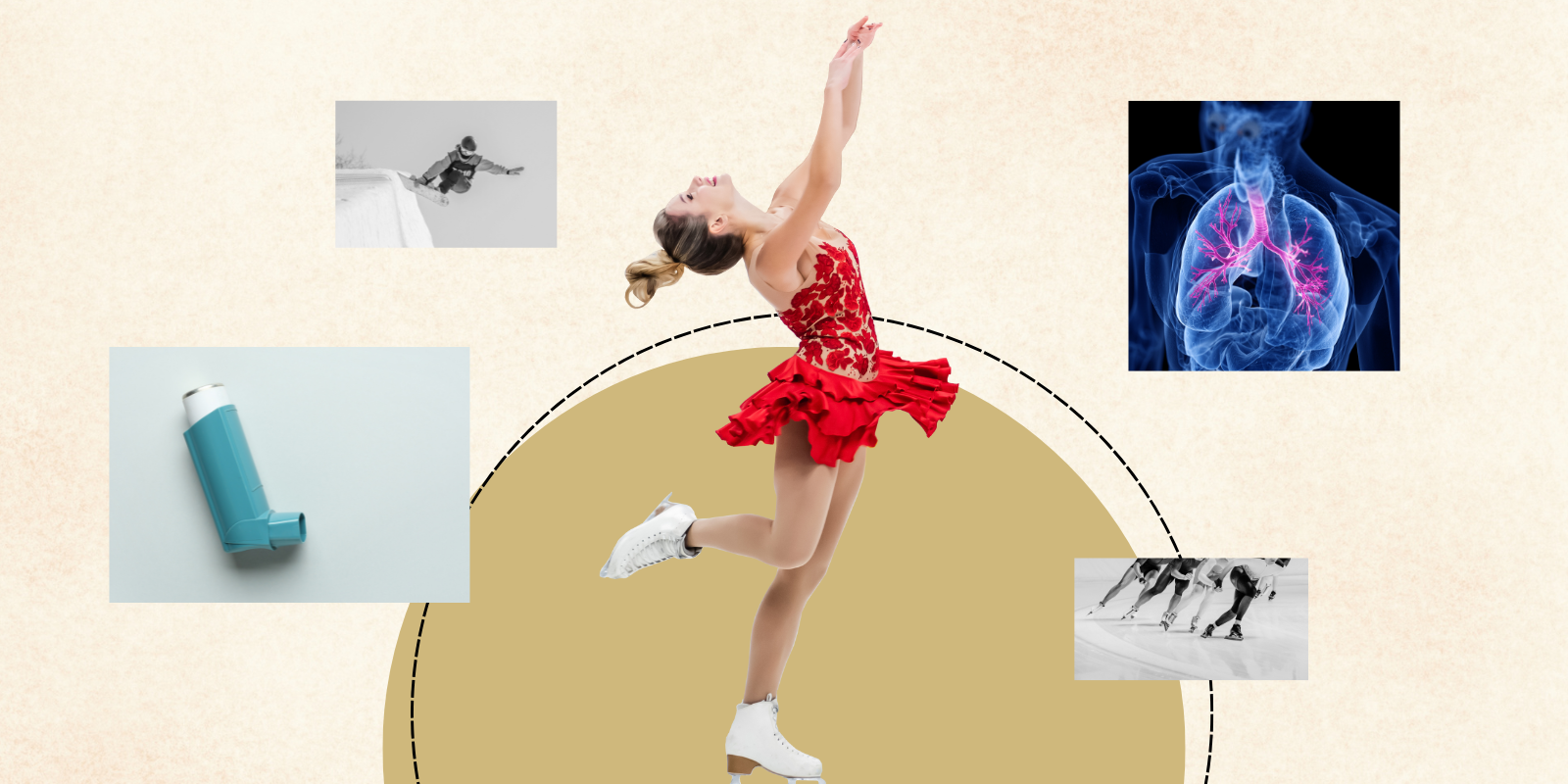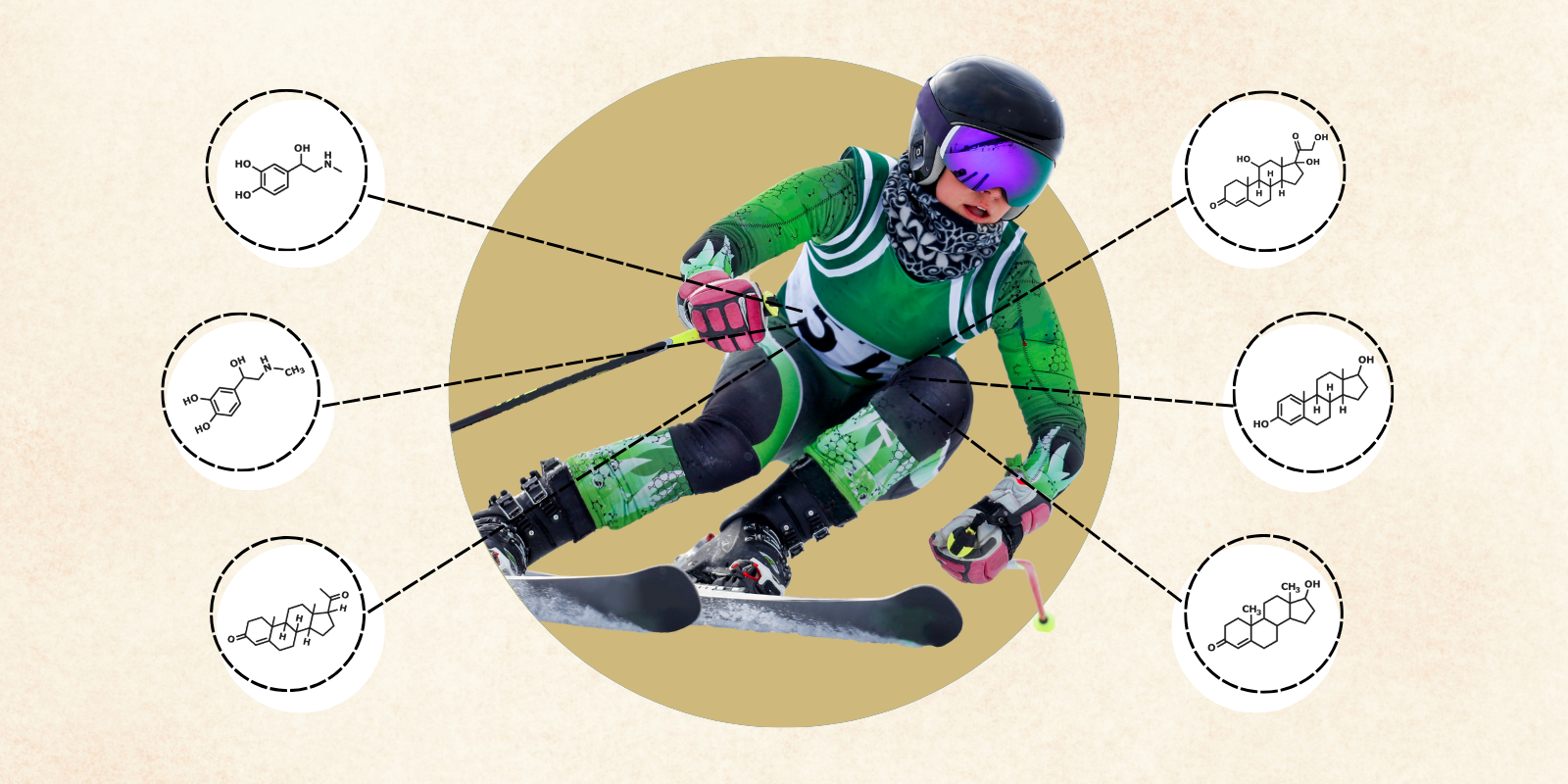After more than two years of virtual-only events, the Department of Medicine hosted the 10th annual Research Day—held in-person and via Zoom—a flagship event to showcase the latest achievements in basic, translational, clinical and outcomes research in medicine.
The event opened with remarks from the Robert W. Schrier Chair of Medicine, Vineet Chopra, MD, MSc, who spoke to the momentous occasion of being able to gather together in person for the first time in two years, and how fortunate that was.
“Our coming together today is testimony to the importance of science and research, and the endless spirit of human innovation that has brought us through this once in a lifetime event,” noted Chopra. “And while we have all sacrificed personally and professionally and many of us in this room have had our own personal battles with COVID-19, I think it’s important for us to remember that we wouldn’t be here without research.”
Research Day Presentations
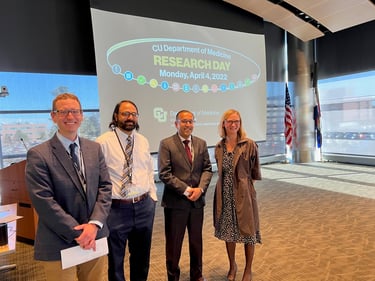
Frank Scott, MD; Sridharan Raghavan, MD; Vineet Chopra, MD, MSc; and Traci Lyons, PhD |
The first talks were from two of the Department of Medicine’s Outstanding Early Career Scholar awardees. Traci Lyons, PhD, associate professor of medicine in the Division of Medical Oncology, shared her research toward identifying remedies for aggressive breast cancers young women in “Novel Treatments for Postpartum Breast Cancers.”
Kristine Erlandson, MD, associate professor of medicine from the Division of Infectious Diseases followed, sharing her research on how to slow or reverse the trajectory of frailty in people with HIV in her presentation, “Integrating Geriatric Medicine in Infectious Diseases.”
Chopra then took the stage to present his transformation of catheter practice in hospital medicine at University of Michigan with “Making MAGIC in Michigan,” an undertaking that resulted in a direct correlation between an increase in appropriate use of IVs and a decrease in major complications across hospitals.
Chopra is now implementing MAGIC in Colorado, both in the Kaiser system and at UCHealth. The resulting research is all free and available online at Improve PICC, including a downloadable MAGIC app that offers recommendations to improve decision-making in vascular access.
David A. Schwartz, MD Mentoring Award Recipient
“Mentorship is the lifeblood of everything we do here,” said Chopra in his intro remarks. “It is the foundation for success, and winners of this award are selfless leaders.”
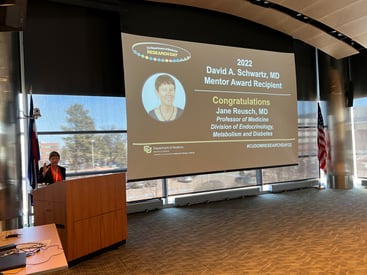
Jane EB Reusch, MD accepts the David A. Schwartz, MD Mentoring Award |
Moderator Sridharan Raghavan, MD, assistant professor of medicine in the Division of Hospital Medicine, presented the Department of Medicine’s annual Mentoring Award, selected by the Outstanding Early Career Scholars. The award is named after David A. Schwartz, MD, the past chair of the Department of Medicine. Raghavan was visibly moved at seeing this year’s awardee, Jane EB Reusch, MD, professor of medicine, Division of Endocrinology, Metabolism and Diabetes.
“I’m choking up because she’s done a lot for me,” said Raghavan, “I didn’t nominate her, but I’m so glad that she’s won.”
Upon accepting the award, Reusch said, “It is easy to mentor when you have the world’s best job.”
Keynote Address Led by Clifford Rosen, MD
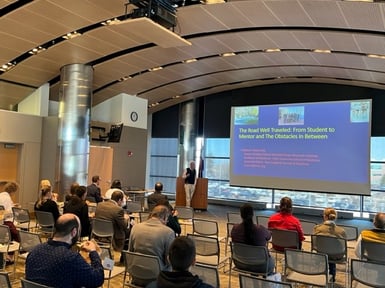
Clifford Rosen, MD delivers the keynote address |
Those who attended in person enjoyed lunch while hearing the unique research journey of keynote speaker Clifford J. Rosen, MD, professor of medicine at Tufts University School of Medicine and director of Clinical and Translational Research and senior scientist at Maine Medical Center Research Institute—“The Road Well Traveled: From Student to Mentor and the Obstacles in Between.”
Rosen regaled attendees with three stories of clinical translational research, including the mentors he valued and the obstacles that arose: The Maze of IGFs; The Paradox of Vitamin D; and The Mystery of Marrow Fat. His research journey to understand the relationship between marrow adipogenesis and osteoblastogenesis began with a trip to Zimbabwe investigating what drove diabetes in undernourished children and carried through to studying hibernating bears in Pennsylvania, with fascinating discoveries along the way.
Rosen concluded with lessons he has learned during his career:
- Persistence pays off;
- Remember: Follow the science and keep an open mind;
- Collaborate!
- Don’t be afraid to let others read your grants and your ideas;
- Know your mentor and never stop being a mentee.
Virtual Poster Session
With more than 70 abstracts submitted for the Department of Medicine’s Research Day virtual poster session, 12 investigators were selected as 2022 Abstract Award Winners, who are listed at the end of this article with links to their research posters.
This year’s virtual poster session included seven different Zoom sessions focused on Immunology, Autoimmunity and Infectious Diseases; Cancer, Hematology and Cell Signaling; Translational Research; Clinical and Outcomes Research; Clinical Research—Immunity/Infectious Diseases and Cancer; and Quality, Process Improvement and Patient Safety. Visit the virtual poster session page to peruse the 70 posters from various researchers in the Department of Medicine.
Overall, Research Day was a success, full of lively discussions and multidisciplinary collaborations across dynamic fields of medicine. And next year, we look forward to hosting the day fully in person.
2022 Abstract Award Winners
Amr Arar, MD: Disparity of Esophageal Biopsy in Racial and Ethnic Minority Patients Causing Underdiagnosis of Eosinophilic Esophagitis
Riannon Atwater, BS: Promoting Appropriate PICC Line Usage through Implementation of an Order Set
Paulo Burke, PhD: PhenoComb: A Discovery Tool to Assess Complex Phenotypes in High-Dimension, Single-Cell Datasets
Nikita Deng, BA: Vaccination Status and Symptom Burden for Outpatients with COVID-19 Infection
Ilaria Ferrari, BS: Defining the Role of CD169/Siglec-1 in Macrophages During Cardiac Wound Healing
Curt Freed, MD: Phenylbutyrate May Stop Progression of Idiopathic Parkinson's Disease
Austin Jolly, BA: The Chromatin Remodeling Protein Brg1 Regulates Adventitial Progenitor Cell Myofibroblast Differentiation and Pathological Vascular Remodeling and Fibrosis
Sizhao Lu, PhD: Resident Vascular Adventitial Progenitor Cells of Smooth Muscle Cell-Lineage Adopt Profibrotic Phenotype and Contribute to Cardiac Fibrosis
Marissa Martin, MD: Use of Crit-Line to Reduce Intradialytic Hypotension in Hospitalized Patients Receiving Dialysis
Julie Ressalam, MPH: Surveying Colorado Physicians on their Medical Aid in Dying Attitudes and Experiences
Marcello Rubino, PhD: Phenotypic Screening Uncovers Eicosanoid Degradation in Fibroblasts as a Therapeutic Target for Cardiac Fibrosis
David Woods, PhD: A Population of Ectoenzyme Expressing T-Cells Is Associated with Immunotherapy Resistance in Metastatic Melanoma Patients
Missed Research Day? Watch the Live Presentations Below

